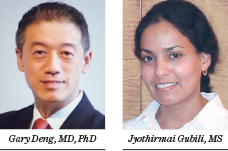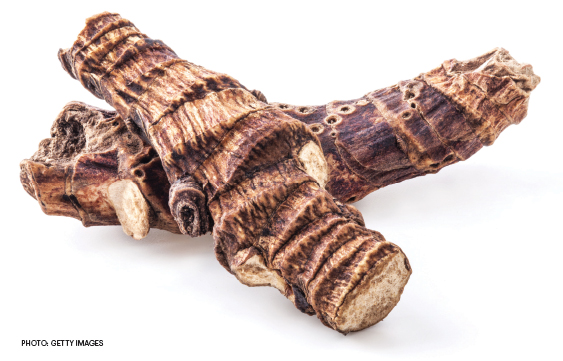
The ASCO Post’s Integrative Oncology series is intended to facilitate the availability of evidence-based information on integrative and complementary therapies sometimes used by patients with cancer. In this installment, Gary Deng, MD, PhD, and Jyothirmai Gubili, MS, present updated information on Ashwagandha—also known as Indian ginseng—because of its increasing popularity as a stress reliever.
Scientific Name: Withania somnifera
Common Names: Indian ginseng, Winter cherry
Overview
Ashwagandha is a shrub prevalent in the dry regions of South and Central Asia and Africa. It is among the popular plants used in Ayurveda, with a medicinal history dating back 3,000 years. The berries, leaves, and roots are employed in formulations to relieve stress, fatigue, and pain and to treat skin diseases, diabetes, gastrointestinal problems, arthritis, and epilepsy. Ashwagandha is also prescribed by many practitioners as a general tonic to improve overall health.
The supplemental forms, sold as capsules, tablets, powders, and liquid extracts, are used to relieve stress, to rejuvenate, and to improve endurance.
The Science
Ashwagandha has demonstrated neuroprotective,1,2 anti-inflammatory,3 immunomodulating,4 chemopreventive,5 and radiosensitizing effects6 in preclinical studies. In addition, improvements in hyperglycemia, hyperinsulinemia, and insulin sensitivity were observed in a murine model of type 2 diabetes.7 Pharmacologic data revealed the active constituents to include alkaloids, steroidal lactones, and saponins.
Ashwagandha has been evaluated for its potential benefits in small clinical studies. For instance, in an early trial involving 81 patients with moderate to severe anxiety lasting longer than 6 weeks, 300 mg of Ashwagandha extract taken twice a day for 12 weeks was reported to decrease anxiety scores by 56.5% (P < .0001), compared with 30.5% (P < .0001) in the control group receiving psychotherapy. Researchers also observed significant differences between the groups in terms of mental health, fatigue, social functioning scores, and overall quality of life.8
Ashwagandha may also be useful against stress, as evidenced in a study of 60 stressed healthy adults randomly assigned to 240 mg extract once daily for 60 days or placebo. Data showed supplementation to significantly reduce measures of anxiety (P = .040) and stress (P = .096), along with reductions in the levels of morning cortisol (P < .001) and dehydroepiandrosterone sulfate (P = .004).9 Additional randomized studies also showed improvements in symptoms and stress levels in patients with schizophrenia after supplementation (as an adjunct to psychotic medications)10,11 as well as improvements in cognitive function in patients with bipolar disorder.12
Furthermore, in 60 patients with knee joint pain, a standardized extract (125 or 250 mg, taken twice daily for 12 weeks) produced significant reductions in pain, stiffness, and disability (250 mg, P < .001; 125 mg, P < .01). The earliest efficacy was seen at week 4 with 250 mg.13
In a randomized trial involving overweight men between the ages of 40 and 70, Ashwagandha (21 mg of withanolide glycosides, once a day, for 8 weeks) was found to elevate testosterone levels, which was not observed in the placebo group.14 The implications for patients with hormone-sensitive cancer are not known.
OF NOTE
Physicians should be aware of the growing patient interest in herbal products for relieving anxiety and stress; of the adverse effects associated with their use; as well as their potential for interacting with some prescription drugs.
Ashwagandha has also been evaluated in oncology settings. In an open-label study, 100 patients with breast cancer were given a standardized extract (2 g every 8 hours) throughout chemotherapy. Researchers reported reduction in chemotherapy-induced fatigue (P < .001 with Piper Fatigue Scale; P < .003 with Schwartz Cancer Fatigue Scale) along with improvement in quality of life (P < .001).15 Larger trials are needed to validate these findings, establish an optimal dose, and determine long-term safety.
Mechanistic studies have shown that withanolides, active compounds derived from the roots and leaves, have biologic effects similar to those of steroids.13 Triethylene glycol, a compound found in the leaves, was identified as an active sleep-inducing compound in a murine model.16
In addition, microarray analysis revealed that Ashwagandha repressed proinflammatory gene expression, including interleukin-6 (IL-6), IL-1β, IL-8, heat shock protein 70, and STAT2, and induced p38/MAPK-kinase expression in a prostate cancer cell line.17 The root extracts were shown to exert cytotoxic effects in lung, colon, central nervous system, and breast cancer cell lines.18 Withaferin A, an active constituent, demonstrated anticancer effects in leukemia cells19 as well as in estrogen receptor–positive and estrogen receptor–negative breast cancer cells, via inducing apoptosis and decreasing tumor size.20

Ashwagandha has also been reported to enhance the effects of radiation therapy21 by reducing tumor glutathione levels6; and to reverse paclitaxel-induced neutropenia22 in murine models.
Adverse Reactions: Case Reports
Common adverse effects include mild-to--moderate and transient drowsiness, upper gastrointestinal discomfort, and loose stools.10,23
Nausea, headache, and gastritis were reported in a clinical study, but they were managed with standard therapies.13
Thyrotoxicosis was observed in a 32-year-old woman following ingestion of Ashwagandha capsules for chronic fatigue. Symptoms resolved after discontinuing its use.24
Burning, itching, and discoloration of skin/mucous membranes were reported in a 28-year-old man after consuming Ashwagandha for decreased libido. Symptoms abated with conventional treatment.25
Ventricular tachycardia has been associated with the use of herbomineral preparations that contained Ashwagandha.26
Elevation of liver enzymes, skin rash, fatigue, fever, edema, and diarrhea were reported in patients with advanced-stage, high-grade osteosarcoma following administration of Withaferin A.27
Herb-Drug Interactions
Anticonvulsants, Barbiturates, and Benzodiazepines: Preclinical studies suggest that Ashwagandha has sedative and GABAergic properties and thus may have additive effects.28,29 Whether these interactions are clinically relevant is not known.
Summary
Limited clinical data suggest the utility of Ashwagandha in reducing anxiety and symptoms of osteoarthritis. In a study of overweight men, Ashwagandha increased testosterone levels. Thus, patients with hormone-sensitive prostate cancer should consult with their physicians before using Ashwagandha.
GUEST EDITOR

Integrative Oncology is guest edited by Jun J. Mao, MD, MSCE, Laurance S. Rockefeller Chair in Integrative Medicine and Chief of Integrative Medicine Service at Memorial Sloan Kettering Cancer Center, New York.
DISCLOSURE: Dr. Deng and Ms. Gubili reported no conflicts of interest.
REFERENCES
1. Kumar S, Harris RJ, Seal CJ, et al: An aqueous extract of Withania somnifera root inhibits amyloid β fibril formation in vitro. Phytother Res 26:113-117, 2012.
2. Shah N, Singh R, Sarangi U, et al: Combinations of Ashwagandha leaf extracts protect brain-derived cells against oxidative stress and induce differentiation. PLoS One 10:e0120554, 2015.
3. Sumantran VN, Chandwaskar R, Joshi AK, et al: The relationship between chondroprotective and anti-inflammatory effects of Withania somnifera root and glucosamine sulphate on human osteoarthritic cartilage in vitro. Phytother Res 22:1342-1348, 2008.
4. Davis L, Kuttan G: Effect of Withania somnifera on CTL activity. J Exp Clin Cancer Res 21:115-118, 2002.
5. Prakash J, Gupta SK, Dinda AK: Withania somnifera root extract prevents DMBA-induced squamous cell carcinoma of skin in Swiss albino mice. Nutr Cancer 42:91-97, 2002.
6. Devi PU: Withania somnifera Dunal (Ashwagandha): Potential plant source of a promising drug for cancer chemotherapy and radiosensitization. Indian J Exp Biol 34:927-932, 1996.
7. Anwer T, Sharma M, Pillai KK, et al: Effect of Withania somnifera on insulin sensitivity in non-insulin-dependent diabetes mellitus rats. Basic Clin Pharmacol Toxicol 102:498-503, 2008.
8. Cooley K, Szczurko O, Perri D, et al: Naturopathic care for anxiety: A randomized controlled trial ISRCTN78958974. PLoS One 4:e6628, 2009.
9. Langade D, Kanchi S, Salve J, et al: Efficacy and safety of Ashwagandha (Withania somnifera) root extract in insomnia and anxiety: A double-blind, randomized, placebo-controlled Study. Cureus 11:e5797, 2019.
10. Chengappa KNR, Brar JS, Gannon JM, et al: Adjunctive use of a standardized extract of Withania somnifera (Ashwagandha) to treat symptom exacerbation in schizophrenia: A randomized, double-blind, placebo-controlled study. J Clin Psychiatry 79:17m11826, 2018.
11. Gannon JM, Brar J, Rai A, et al: Effects of a standardized extract of Withania somnifera (Ashwagandha) on depression and anxiety symptoms in persons with schizophrenia participating in a randomized, placebo-controlled clinical trial. Ann Clin Psychiatry 31:123-129, 2019.
12. Chengappa KNR, Bowie CR, Schlicht PJ, et al: Randomized placebo-controlled adjunctive study of an extract of Withania somnifera for cognitive dysfunction in bipolar disorder. J Clin Psychiatry 74:1076-1083, 2013.
13. Ramakanth GSH, Uday Kumar C, Kishan PV, et al: A randomized, double blind placebo-controlled study of efficacy and tolerability of Withania somnifera extracts in knee joint pain. J Ayurveda Integr Med 7:151-157, 2016.
14. Lopresti AL, Drummond PD, Smith SJ: A randomized, double-blind, placebo-controlled, crossover study examining the hormonal and vitality effects of Ashwagandha (Withania somnifera) in aging, overweight males. Am J Mens Health 13:1557988319835985, 2019.
15. Biswal BM, Sulaiman SA, Ismail HC, et al: Effect of Withania somnifera (Ashwagandha) on the development of chemotherapy-induced fatigue and quality of life in breast cancer patients. Integr Cancer Ther 12:312-322, 2013.
16. Kaushik MK, Kaul SC, Wadhwa R, et al: Triethylene glycol, an active component of Ashwagandha (Withania somnifera) leaves, is responsible for sleep induction. PLoS One 12:e0172508, 2017.
17. Aalinkeel R, Hu Z, Nair BB, et al: Genomic analysis highlights the role of the JAK-STAT signaling in the anti-proliferative effects of dietary flavonoid—‘Ashwagandha’ in prostate cancer cells. Evid Based Complement Alternat Med 7:177-187, 2010.
18. Jayaprakasam B, Zhang Y, Seeram NP, et al: Growth inhibition of human tumor cell lines by withanolides from Withania somnifera leaves. Life Sci 74:125-132, 2003.
19. Malik F, Kumar A, Bhushan S, et al: Reactive oxygen species generation and mitochondrial dysfunction in the apoptotic cell death of human myeloid leukemia HL-60 cells by a dietary compound withaferin A with concomitant protection by N-acetyl cysteine. Apoptosis 12:2115-2133, 2007.
20. Stan SD, Hahm ER, Warin R, et al: Withaferin A causes FOXO3a- and Bim-dependent apoptosis and inhibits growth of human breast cancer cells in vivo. Cancer Res 68:7661-7669, 2008.
21. Devi PU, Sharada AC, Solomon FE: In vivo growth inhibitory and radiosensitizing effects of withaferin A on mouse Ehrlich ascites carcinoma. Cancer Lett 95:189-193, 1995.
22. Gupta YK, Sharma SS, Rai K, et al: Reversal of paclitaxel induced neutropenia by Withania somnifera in mice. Indian J Physiol Pharmacol 45:253-257, 2001.
23. Tandon N, Yadav SS: Safety and clinical effectiveness of Withania somnifera (Linn.) Dunal root in human ailments. J Ethnopharmacol 255:112768, 2020.
24. van der Hooft CS, Hoekstra A, Winter A, et al: Thyrotoxicosis following the use of ashwagandha. Ned Tijdschr Geneeskd 149:2637-2638, 2005.
25. Sehgal VN, Verma P, Bhattacharya SN: Fixed-drug eruption caused by Ashwagandha (Withania somnifera): A widely used Ayurvedic drug. Skinmed 10:48-49, 2012.
26. Dwivedi S, Aggarwal A, Sharma V: Cardiotoxicity from ‘safe’ herbomineral formulations. Trop Doct 41:113-115, 2011.
27. Pires N, Gota V, Gulia A, et al: Safety and pharmacokinetics of Withaferin-A in advanced stage high grade osteosarcoma: A phase I trial. J Ayurveda Integr Med 11:68-72, 2020.
28. Kumar A, Kulkarni SK: Effect of herbals on sleep and their interactions with hypnotic drugs. Indian J Pharm Sci 67:391-393, 2005.
29. Shukla SD, Bhatnagar M, Khurana S. Critical evaluation of ayurvedic plants for stimulating intrinsic antioxidant response. Front Neurosci 6:112, 2012.
Dr. Deng is Medical Director, Integrative Medicine Service; Attending Physician; and Clinical Member, Memorial Sloan Kettering Cancer Center, New York. Ms. Gubili is Editor, Integrative Medicine, Memorial Sloan Kettering Cancer Center, New York.

